Vimercate
Vimercate (Italian pronunciation: [vimerˈkaːte]; Brianzöö: Vimercaa [ʋimerˈkɑː]) is a city and comune in the province of Monza and Brianza, Lombardy, northern Italy. It is 25 kilometres (16 mi) from Milan and 10 kilometres (6 mi) from Monza.
Vimercate | |
|---|---|
| Città di Vimercate | |
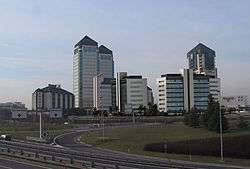 The business district | |
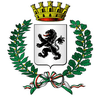 Coat of arms | |
Location of Vimercate 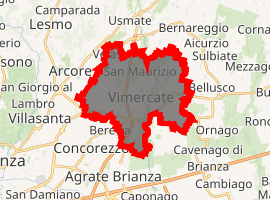
| |
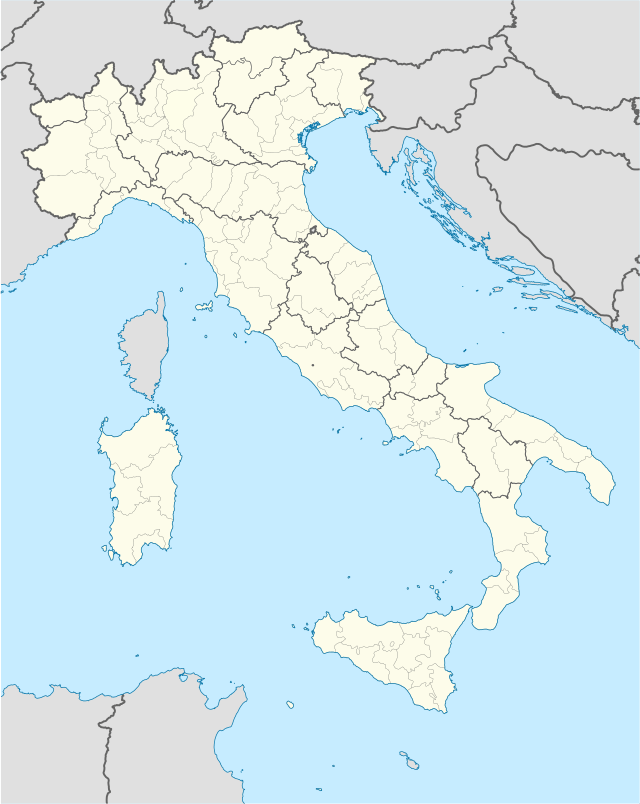 Vimercate Location of Vimercate in Italy 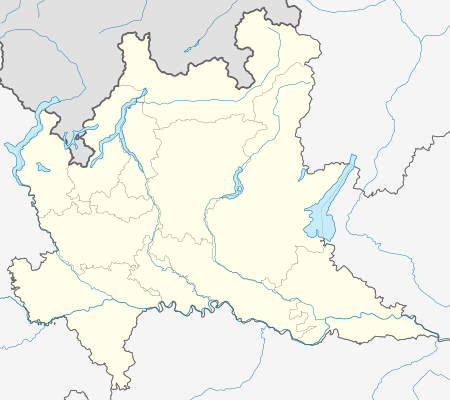 Vimercate Vimercate (Lombardy) | |
| Coordinates: 45°37′N 9°22′E | |
| Country | Italy |
| Region | Lombardy |
| Province | Monza and Brianza (MB) |
| Frazioni | Ruginello, Oldaniga, Oreno, Velasca |
| Government | |
| • Mayor | Francesco Sartini |
| Area | |
| • Total | 20.67 km2 (7.98 sq mi) |
| Elevation | 194 m (636 ft) |
| Population | |
| • Total | 26,156 |
| • Density | 1,300/km2 (3,300/sq mi) |
| Demonym(s) | Vimercatesi |
| Time zone | UTC+1 (CET) |
| • Summer (DST) | UTC+2 (CEST) |
| Postal code | 20871 |
| Dialing code | 039 |
| Patron saint | Saint Stephen |
| Saint day | 3 August |
| Website | Official website |
The city was founded by the Romans on the banks of the river Molgora.
Main sights
Saint Francis's Convent (Banfi Family)
A hostel at the site was founded in 1052, just outside the walls of medieval Vimercate, offering refuge and assistance to travellers and pilgrims. In the first half of the 13th century Franciscan friars from the nearby monastery in Oreno, traditionally believed to have been visited by St Francis himself, and founded the new Franciscan monastery under the "Custody of Monza". During the 13th century it increased in importance and was occupied by Lectors and Maestri.
In one of the frescoes in the convent is an ornament (circa 1311) showing the coats of arms of the Visconti and Della Torre families. The date is the time when a truce between the two families was signed on Epiphany of that year. The truce between the two Milanese families was guaranteed by Henry VII, Holy Roman Emperor. In 1456 Francesco Sforza, Duke of Milan, provided a special grant with an annual offering of fifty florins, founding the Cappellania di San Francesco (Chapter of the Chapel of Saint Francis) in the church.
In 1798 the monastery, suppressed by the Cisalpine Republic, was sold in 1799 by the Feudal Mayor of Vimercate, Dr Giuseppe Banfi. He conceded the use of the monastery to the six remaining friars, supporting them for life. Afterwards he transformed the monastery into a residence. Since then the Banfi family has owned the site.
In different areas of the monastery there are some fragments of frescos, which, even if quite small, make it possible to distinguish two subsequent attempts at decorating the church during the first half of the fourteenth century, evidence of the prestige of the monastery in that period.
Other sights
- Saint Stephen's Basilica (Collegiata di Santo Stefano, 13th century)
- Church of Virgin Mary (Santuario della Beata Vergine del Rosario)
- Ponte di San Rocco (3rd century), the oldest still-functioning Roman bridge in northern Italy. In the Middle Ages it received two gates
- Palazzo Trotti. It has 18th-century paintings by Giuseppe Antonio Felice Orelli
- Villa Sottocasa (early 18th century)
The area of Oreno has maintained its medieval look with an 11th-century monastery, Saint Michael's Church and the stately homes Villa Gallarati Scotti and Villa Borromeo.
The town has more new developments such as the Torri Bianche skyscrapers which host a 16 screen cinema, a shopping arcade and many county offices plus the new Central Bus Station designed by Mario Botta in 1998, which serves the area and has many facilities.
On the east side of the city rises the "Centro Scolastico Omnicomprensivo", a scholastic centre, which is known for the quality and high standards of the "Licei" (High Schools). Particularly renowned is the Scientific and Classic Liceo "Antonio Banfi". Within the communal borders there are many parks, used for concerts and shows.
Vimercate received the honorary title of city with a presidential decree on June 28, 1950.
People
- Emis Killa (1989), rapper
- Matteo Morandi (1981), gymnast, 2012 Olympic bronze medalist on still rings
- Salaì, (1480-1524), artist and pupil of Leonardo da Vinci.
References
- "Superficie di Comuni Province e Regioni italiane al 9 ottobre 2011". Istat. Retrieved 16 March 2019.
- Data from Istat
- "Popolazione Residente al 1° Gennaio 2018". Istat. Retrieved 16 March 2019.
External links
| Wikimedia Commons has media related to Vimercate. |
- Official website
- Mirabilia Vicomercati Art and History
- Oreno di Vimercate web site
- MUST Museum